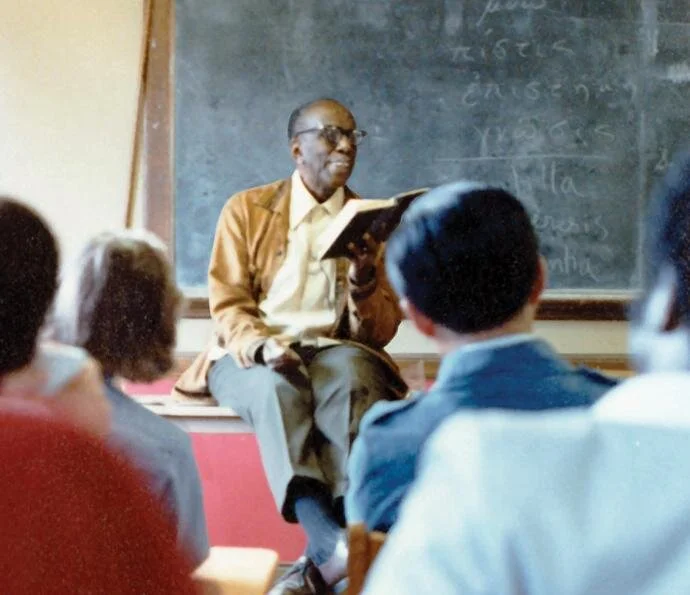Friday Reflection: Remembering Renée Claire Fox (1928 – 2020)
“Just to be is a blessing. Just to live is holy…. To be or not to be is not the question. The vital question is: how to be and how not to be.”
I. I am writing this week not about anyone from the Episcopal Lectionary of Holy People as I normally do, but about my friend Renée Fox who died of leukemia on Wednesday, September 23 at 92 years of age. Her life was exceptional, and in many ways, Renée Fox lived a holy life which is, of course, the last thing she would say about herself. But I want to write about her: she has no say in the matter.
II. Ours was a unique friendship, but perhaps no more unique than Renée’s friendships with scores and scores of others. With Renée Fox, friendship was a gift, a gift as much for her friends as it was for her. What’s more, over the course of her professional life, Renée created and sustained friendships with all varieties of people. A reader would find most all of these friends identified and written about in her last book, Explorations of a Mind-Traveling Sociologist [2019]. It is my sense that Renée treasured every last one of her friendships. She both sustained and was herself sustained by these friendships, all of which were enduring and many of which were rich and always grounded in Renée’s extraordinary generosity of heart.
III. After receiving her Ph.D in Sociology from Radcliffe College, Harvard University, in 1954, Renée spent years teaching at Barnard College, Columbia University and Harvard. In 1969 Renée Fox became a full professor in the Department of Sociology at the University of Pennsylvania, from which she retired in 1998. At her retirement, Renée was Professor in Sociology and in the Schools of Medicine and Nursing, Annenberg Professor of the Social Sciences, and Senior Fellow of the Center for Bioethics. (Renée received emerita that same year.) She was Chair of the Department of Sociology from 1972 to 1978. During her tenure, the Department appointed its first African American professor and first Catholic Priest professor. Renée also held appointments in the Departments of Medicine and Psychiatry. Her publications were extensive and ground-breaking. She continued to write and publish until her death. She never ceased to be curious and eager to learn, and she was ever disciplined and productive in her work. In many ways, it was Renée’s vital curiosity and her hunger for learning that kept her going, especially in these last years when she worked so faithfully to finish Explorations of a Mind-Traveling Sociologist.
IV. Despite the fact that Renée Fox contracted bulbospinal polio when she was in her first year of college, she finished her undergraduate work at Smith College and went on to study at Harvard –with Talcott Parsons—where she received a Ph.D in Sociology in 1954. She received any number of academic awards and honors, but she was still a woman in a field of men. The odds were never in her favor and yet here is what she accomplished as described by two sets of colleagues at Penn:
“Renée Fox was a renowned medical sociologist whose impact is felt worldwide. Her teaching and research focused on sociology of medicine, medical research, medical education, and medical ethics. She carried out first-hand participant observation-based studies not only in the United States but also Continental Europe, Russia, Central Africa, and the People’s Republic of China. She lectured in colleges, universities, and medical schools throughout the United States, and taught in a number of universities around the world.”
—Department of Sociology at UPenn, September 23, 2020, “In Memoriam: Renée Fox”
“Regarding bioethics, Renée was both a founder and persistent critic of the field. She did not consider herself a bioethicist, but her keen moral insights about the medical enterprise and her penchant for vigorous ethical argument tell a different story. Being both an insider and outsider enabled her to shed light on the innards of [the] field, questioning research methods and priorities, and always challenging bioethics scholars to return to the basics of seeking justice in an unjust world.”
—Department of Medical Ethics and Health Policy at UPenn, September 23, 2020, “In Memoriam: Renée Fox”
Renée’s spirit of “seeking justice in an unjust world “ allows us to reference a penetrating requirement offered by the prophet Micah: “….Oh mortal, what is good; and what does the Lord require of you but to do Justice, and to love kindness, and to walk humbly with your God”? (Micah 6: 8) This is exactly how Renée Fox led her life.
V. I met Renée Fox sometime after I came to Philadelphia in 2005 to begin my work as the Head of the Charter School for Architecture and Design (CHAD). As I think back to my first encounter with Renée, I am reminded that as our friendship developed, I began to think and feel that I had known her forever, which, of course, I hadn’t. Renée had a Ph.D student at Penn who was a Post-Doc at Yale, working with one of Renée’s former departmental colleagues at Penn, who was then a professor at Yale. I’m tempted to say that this set of seemingly crazy connections is how friendship with Renée worked: one friend and/or a former student or colleague would lead to a new friend. The professor at Yale, after talking with Renée I suspect, called and asked if I could develop a project at CHAD for his Post-Doc. Renée weighed in at some point and, the next thing I knew, the Post-Doc and I were in Renée’s apartment talking about the project and about schools and public education. The project took shape and the Post-Doc began her work assessing our school based on her training and perspective as a sociologist. It was a fascinating and valuable project and Renée believed it could be an important contribution to the growing number of studies about charter schools and public education. I think it was then that Renée and I began writing occasionally to each other about my school work and the Post-Doc’s study project, mostly because I valued her uncanny ability to see how social institutions, like schools, work, and how a study of them could be shaped. It was Renée who helped all of us see that academic scholarship could be important because it could affect those vital institutions at a very critical time in their growth and development.
VI. A writer and religion editor for Publishers Weekly, someone I respected very much and whose writings I admired and appreciated, was a person who reminded me very much of Renée. This was Phyllis Tickle who wrote a book about her life entitled The Shaping of a Life: A Spiritual Landscape. Sadly, I never met Phyllis Tickle, who died in September,2015, and I never talked about her work with Renée. All this comes back to me now, in these days after Renée’s death: those many books and writers we both ought to have known and talked about. If Renée had her way, she and Phyllis Tickle would have met. Look what we all missed!
VII. And then there is Hildegard of Bingen whom the church remembers on September 17. Hildegard, monastic, mystic, doctor, composer, poet and dramatist, and scientist; Hildegard, counselor and confidant, and correspondent of queens and kings, archbishops and popes, and abbots and abbesses. Hildegard, who lived and served in a world dominated by men and commanded respect, admiration and authority because she was so good at what she did and so authentic in the way she led her life. Hildegard, too, reminded me of Renée or perhaps I should say, Renée reminded me of Hildegard, who lived almost 1000 years ago. Why, you ask? Because I believe firmly that Renée had a deep spiritual life, in its own way not unlike the spiritual life of Hildegard, for like Hildegard, Renée went out to the world in service, bringing to this service her thanksgivings, blessings and friendships.
VIII. Now, imagine how it was to have met, have known and have shared a life of friendship with Renée Fox. First of all, I was keenly aware of how enriching my friendship with Renée was for me. This is not to say that it may not have been enriching for her, as well, but rather it was she who gave strength and vitality to our friendship. This is what I felt-- always. Her generosity of heart was surpassed only by her gracious and supportive words. “Peter, you should turn these essays into a book.” “Peter, your visit meant so much to me.” “Peter, thank you for your blessings and your prayers of healing.”
IX. Yes, Renée was very observant, and she saw things that others did not see. She had what I call the “gift of translation.” I’ve often thought this is what the Old Testament writers would call wisdom, but it is also a kind of holy presence. “All that you have said was spoken out of a true heart, and there is no one who can deny your words…[this} is not the first time your wisdom has been shown, but from the beginning of your life all the people have recognized your understanding, for your heart’s disposition is right. (Judith 8: 28-29). Renée, as she put it, always felt that “being a teacher continues to be core to my identity.” (Explorations of a Mind-Traveling Sociologist, p. 169.) Who would not be moved and engaged by one who teaches with wisdom and grace, goodness and love? Who would not be moved and engaged by a teacher of uncommon intelligence and warmth, driven by altruistic service, a person who was not the least bit afraid of pursuing the endless search for the self. And, in addition to all these qualities of superb teaching, Renée was a person who often learned as much as she taught.
X. The “shaping of a life” reveals the geography of a life, and Renée Fox’s life was shaped by the geography of her research and field work, for example her work with Doctors without Borders (MSF).
What allowed Renée to take so much from her field work was her respect for the rituals and customs of the people she was studying. This was another great gift of her friendship: you knew that you were respected and taken seriously as who you were, with your own “customs” and “rituals.” This was part of what many have called Renée’s ecumenism. While she respected boundaries, she did not let these boundaries impede her understanding of and respect for other institutions –and individuals—she engaged with. Once, in our early correspondence, Renée and I discussed a piece by a political scientist whose work we both respected and admired. Renée found the piece wanting in its “intelligent analysis;” in other words, wanting and deficient, and she was troubled by the incompleteness of the piece. I missed this deficiency because I had not read the piece carefully enough. Renée was very specific and respectful of words, and she used them very deliberately and thoughtfully. And I believe she wrote out of courage and knowledge on the one hand, and clarity, understanding, and humility on the other hand.
XI. The exchange I mentioned above came in January 2017, some months after Renée and I had been writing to each other more frequently. What I didn’t realize until I sat down to write this piece is that the January communication formalized what would become a daily email correspondence, which continued until a week or so before Renée’s death. I would send her pieces throughout most of each day and she would respond with brief and pithy comments. And she would send me things that interested her almost every day, as well, and I would respond. And I, of course, would ask her to read things I had written and, occasionally, she would ask me to read something she had written. Our correspondence was a kind of journal keeping, grounded, I think, in mutual curiosity and shared interests, mutual respect and trust, a fierce attachment to one another, and the not insignificant matter of staying connected. What the correspondence became was a chronicle of two people teaching and learning from each other; perhaps even a bit of “mind-traveling.” Not only did we develop a deep friendship based on love, but we spoke and wrote as much from our souls as we did from our minds and hearts. And in the end, and through the grace of God, it is I who was blessed by the gift of Renée Fox.
Give instructions to the wise, and they will become wiser still;
teach the righteous and they will gain in learning.
The fear of the Lord is the beginning of wisdom,
and the knowledge of the Holy One is insight.
For by me your days will be multiplied,
and years will be added to your life.
If you are wise, you are wise for yourself;
if you scoff, you alone will bear it.
-Proverbs 9:9-12
May she rest in the Peace she has earned with her life. Amen.
If you’re interested in knowing her professional story, you can find Renée on Wikipedia.
—Father Peter Kountz










